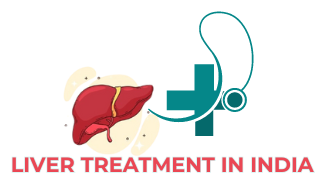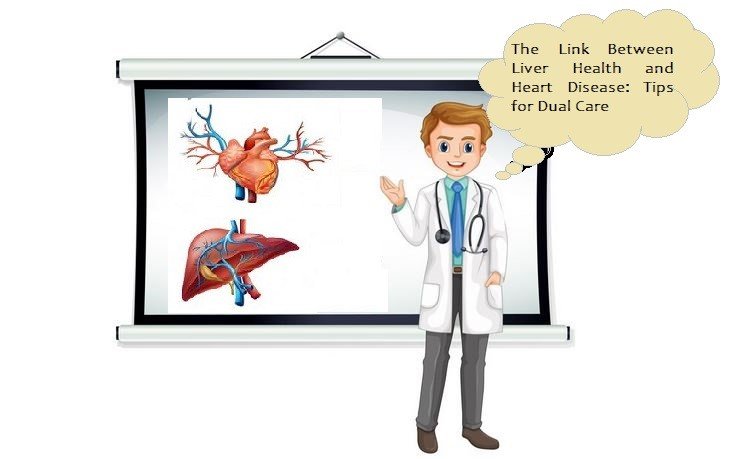Overview: Exploring the Link Between Liver Health and Heart Disease
The health of your entire body largely depends on the functioning of the liver and heart. According to a liver expert doctor, understanding the complex relationship between liver health and heart disease underlines the importance of a holistic approach to the medical management of your liver and heart conditions. It is vital for the liver to be healthy for good health and the health of the liver means the health of the heart. If any of these do not work properly, then the risk of many major diseases also increases due to the diseases related to them.
Studies by top rated liver transplant hospitals and their experts have shown that there is a strong link between liver health and heart disease, with interventions targeting liver function and metabolic health being able to provide substantial benefits in risk reduction for liver and heart disease. Although a liver treatment doctor says that the liver is the youngest organ of your body which keeps rejuvenating itself, in today’s time there is a strong need for lifestyle strategies for liver and heart health that will be beneficial for our overall health. In this blog, we explore the dual care for liver and heart, and we cover everything from shared risk factors and comorbidities to the impact of liver function on heart health and tips for maintaining liver and heart health.
Shared Risk Factors and Comorbidities
The discovery of the link between liver health and heart disease reveals a complex interplay between these two organ systems, including shared risk factors and comorbidities between the liver and heart. Although traditionally these organs have been viewed as separate entities, emerging research has highlighted the complex connections and shared pathways between liver function and cardiovascular health. Top liver transplant expert in India often explains that, usually, liver problems affect your heart, while in conditions like acute heart failure, insufficient blood flow to the liver can also cause liver damage.
However, if we talk about the shared risk factors and comorbidities between liver and heart, the health conditions of both are affected by common risk factors like obesity and metabolic syndrome, insulin resistance and diabetes, high cholesterol and triglycerides, often leading to cardiovascular disorders. What is defined in medicine as the liver-heart axis refers to the bidirectional relationship and communication between the liver and the heart, where the health and function of one organ have a significant impact on the other.
Obesity and Metabolic Syndrome
Obesity serves as a common precursor to both liver and heart diseases. According to a top liver transplant specialist in India, it often manifests as non-alcoholic fatty liver disease (NAFLD) and contributes to the development of metabolic syndrome. Metabolic syndrome, which is characterized by a group of conditions including abdominal obesity, high blood pressure, insulin resistance, and dyslipidemia, significantly increases the risk of both liver and cardiovascular disorders. This interaction underlines the importance of weight management and lifestyle modification in reducing the risk of these conditions.
Insulin Resistance and Diabetes
Insulin resistance, a key feature of metabolic syndrome and NAFLD, is closely linked to the development of type 2 diabetes mellitus. According to our liver specialist doctor at a top liver transplant clinic in India, insulin resistance impairs glucose uptake by cells, leading to increased blood sugar levels, leading to chronic hyperglycemia. This not only increases liver damage but also contributes to endothelial dysfunction and atherosclerosis. Due to this, the risk of cardiovascular events increases.
High Cholesterol and Triglycerides
According to our liver transplant surgeon at the top liver transplant centre in India, increased levels of cholesterol and triglycerides are shared risk factors for liver and heart diseases. Dyslipidemia, characterized by an abnormal lipid profile including high levels of LDL cholesterol and triglycerides and low levels of HDL cholesterol, contributes to the development of atherosclerosis and fatty liver disease. Atherosclerosis increases the risk of coronary artery disease and myocardial infarction, while hepatic lipid accumulation can progress to more severe forms of liver disease.
Influence of Liver Function on Cardiovascular Health
The liver plays a vital role in your body’s metabolism, lipid regulation, and detoxification, all of which have a profound impact on cardiovascular function. Non-alcoholic fatty liver disease (NAFLD), characterized by excessive fat accumulation in the liver, often coexists with metabolic syndrome and significantly increases the risk of cardiovascular events. Top rated liver transplant hospitals often emphasize in their awareness programs that conditions such as non-alcoholic fatty liver disease (NAFLD) and viral hepatitis can lead to conditions such as systemic inflammation, insulin resistance, and dyslipidemia, which can lead to atherosclerosis, hypertension, increased risk of various heart diseases like high blood pressure and heart failure.
However, timely medical management of liver and heart conditions by consulting your liver specialist doctor to optimize liver health can be successful in maintaining cardiovascular health and preventing cardiovascular events that put you at risk for liver and heart disease. Otherwise, impaired liver function may result in alterations in coagulation factors and stimulate the production of bioactive molecules called hepatocytes, which affect vascular health and heart function.
Strategies for Dual Care: Tips for Maintaining Liver and Heart Health
The liver plays a vital role in keeping your entire body healthy and functioning optimally, while the heart, a vital organ of our body, acts as the lifeline that sustains our life. The heart is responsible for pumping blood and nutrients throughout your body, while the liver is responsible for detoxifying the toxins mixed in the blood throughout your body. That is the reason, dual care strategies of liver and heart can help in reducing the risk of liver and heart diseases.
Fortunately, there are many tips and suggestions to promote and approve the dual care of liver and heart, which may play a central role in reducing your risk of liver and heart disease and maintaining overall health and vitality. According to the best liver transplant specialist in India guidelines, in the strategies for dual care, you may mainly adopt a heart-healthy diet, regular physical activity for heart health, and monitor liver health through lifestyle choices.
Adopting a Heart-Healthy Diet
A heart-healthy diet is beneficial not only for heart health but also for liver function. For a heart-healthy diet, you can eat lots of fruits and vegetables that give you nutrition rich in antioxidants and fiber, which help reduce inflammation and promote healthy digestion. You can also include lean meat, fish, poultry, beans, and tofu in your diet. Adopting a heart-healthy diet gives you the nutrients you need without the added saturated fats that can contribute to lower risks, such as high cholesterol and triglycerides.
Regular Physical Activity for Cardiovascular Fitness
Regular exercise is important for maintaining your overall health, including heart health, and may also benefit liver function. According to top liver transplant doctors, medical management of the liver and heart conditions of people recovering from liver transplants is essential, and incorporating the recommended regular physical activity into their lifestyle choices can provide effective benefits. However, lifestyle strategies for liver and heart health can include exercises such as aerobic exercise, flexibility exercises, and strength training.
- Aerobic exercise: Engage in activities such as walking, jogging, swimming, or cycling for at least 150 minutes per week to improve heart health and promote weight management.
- Strength training: Incorporate resistance exercises using weights or resistance bands to increase muscle strength, improve metabolism, and support overall health.
- Flexibility exercises: Incorporate stretching or yoga to improve flexibility, balance, and joint health, reducing the risk of injuries during physical activity.
Monitoring Liver Health Through Lifestyle Choices
Monitoring liver health through lifestyle choices means choosing a lifestyle that plays an important role in liver health. For this, attention can be focused on the given points.
- Limit alcohol consumption to promote liver health and reduce the risk of liver disease and cardiovascular complications.
- Avoid smoking as smoking is associated with an increased risk of both heart disease and liver cancer.
- Excess body weight, especially abdominal obesity, is a risk factor for both liver disease and heart disease. You can aim for a healthy weight through balanced nutrition and regular exercise as part of your lifestyle.
Importance of Regular Health Screenings
Regular health checkups for liver and heart health are essential to maintain overall health and prevent serious medical conditions. These screenings are vital in enabling early detection, prompt intervention, and treatment when necessary. Screening helps a liver expert doctor to do individual medical management of liver and heart conditions.
Collaboration Between Specialists
Collaboration between specialists can detect conditions such as fatty liver disease, viral hepatitis, or liver cancer, allowing timely management and lifestyle modifications to prevent disease progression. Similarly, screening for heart health helps identify risk factors such as high blood pressure, cholesterol levels, and heart rhythm abnormalities, allowing healthcare providers to implement preventive measures and risk reduction for liver and heart diseases such as heart attacks. It helps to manage liver and heart conditions.
Coordinated Care Between Cardiologists and Hepatologists
Cardiologists specialize in diagnosing and treating heart-related conditions, while hepatologists focus on liver diseases. Collaboration between these specialists ensures comprehensive management of conditions that affect both organs. According to the best liver transplant surgeons, failure to risk reduction for liver and heart disease in time can lead to liver transplant -like conditions, including non-alcoholic fatty liver disease. Considering both risk factors and liver health indicators such as disease NAFLD and metabolic syndrome, and holistic assessment of patients can reduce the risk of cardiovascular complications due to factors such as inflammation, insulin resistance, and dyslipidemia. By working together, cardiologists and hepatologists can develop personalized treatment plans that address each patient’s specific needs.
Integrated Treatment Plans for Dual Health Management
A top liver transplant hospital in India often incorporate a comprehensive approach into integrated treatment plans for dual health management of liver and heart diseases that address the unique needs and interplay between these two vital organs. Being a top liver transplant center, dual health management of liver and heart diseases at Dr L H Hiranandani Hospital typically involves a team of health care professionals, including hepatologists and physiologists, collaborating to develop and implement integrated treatment plans tailored to your needs.
It involves comprehensive assessment, risk factor modification, medication management, coordination of care, monitoring, and follow-up, along with patient education and empowerment to implement treatment plans that address both liver and heart health holistically. Our specialists can best optimize your results, reducing the burden of your dual health conditions while improving your quality of life.
Discovering the connection between liver health and heart disease underlines the importance of overall health management in today’s busy lives. While maintaining our health can be a challenge, it is also important in our busy lives. Being a top liver transplant center in India, we cover every topic in this blog that focuses on the important measures associated with dual care of the liver and heart. The complex relationship between liver health and heart disease underlines the importance of holistic health management. It focuses on steps such as adopting heart-healthy dietary choices, engaging in regular physical activity for cardiovascular fitness, and monitoring liver health through lifestyle modifications with consideration of shared risk factors and comorbidities. By prioritizing these tips for dual care, you can reduce your risk of liver disease and heart disease, thereby improving your quality of life and longevity. However, for effective results, a liver expert doctor may advise you to undergo regular medical checkups in medical management of liver and heart conditions because it helps in the early detection and intervention of risk reduction for liver and heart disease. Liver specialists can help with lifestyle strategies for liver and heart health. Thus, by recognizing and addressing the interconnection between liver health and heart disease, you can actively protect your health and well-being in the long run.

